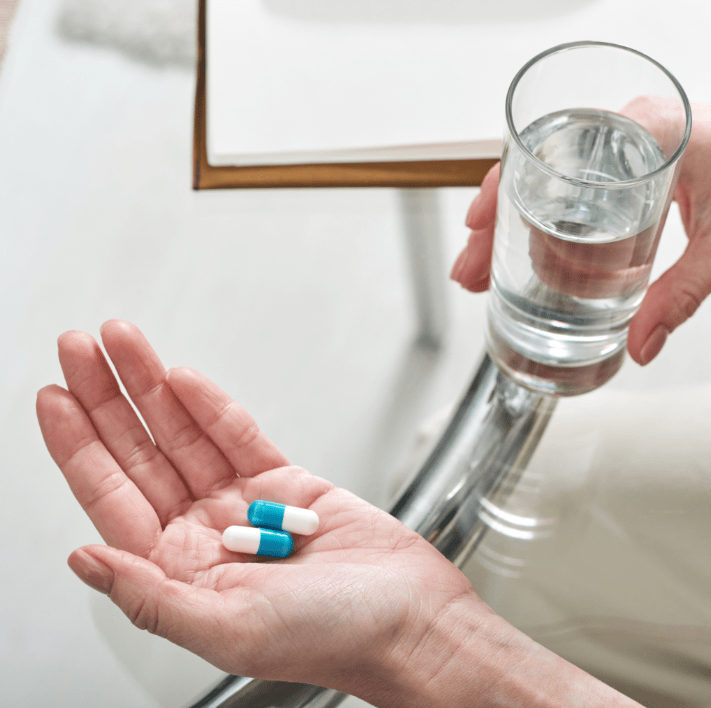Best Medications for Low Libido
Hey there! Are you suffering from low libido, or low desire for sex? Is it bothering you or having an impact on your life? If so, then read on, because in this blog we are going to take a look at the best medications for low libido. Remember that low libido can have various underlying causes, so finding the root cause or the best medication depends on your unique situation.
It’s always best to talk with us at The Libido Doctor, or your doctor, for personalized advice tailored to you. But in the meantime, here is some info to get started!

The best meds for low libido in women include:
Testosterone
One option for low libido is testosterone therapy. Testosterone is a hormone that plays a crucial role in sexual desire and behavior in both men and women. If low libido is due to low testosterone levels, consider testosterone replacement therapy. This therapy comes in different forms like gels, patches or injections.
Testosterone has not actually been officially approved as a therapy for women by the FDA. But it can be prescribed off- label to women for low libido. However, there are side effects that you should know about. They include acne, hair growth on the face and body, hair loss on the head, weight gain and a deepening voice.
Wellbutrin for Depression
If low libido is related to depression, you might consider bupropion, sold under the brand name Wellbutrin. It’s an antidepressant that has positive effects on libido, especially in women with depression-related low libido. By improving your mood, bupropion may also enhance sexual desire and satisfaction.
As with all medications, Wellbutrin has side effects. They include headache, weight loss, dry mouth, trouble sleeping/ insomnia, nausea, dizziness, constipation, fast heartbeat, sore throat, even a risk of suicidal thoughts and behaviors and in rare cases, seizures.
Flibanserin
Flibanserin, sold under the brand name Addyi, is a medication approved for pre-menopausal women with low libido. It’s FDA-approved and designed to address low sexual desire in women. Flibanserin acts on neurotransmitters in the brain, increasing sexual desire. It also increases the number of satisfying sexual events and decreases the distress associated with low sexual desire.
The more common side effects of Flibanserin to be aware of are blurred vision, confusion, dizziness / fainting / lightheadedness when getting up suddenly from a lying or sitting position, sleepiness / drowsiness, sweating and unusual fatigue or weakness. It enhances the effects of alcohol and some OTC medicines such as antihistamines / medicines for hay fever, allergies or colds. So, it is recommended to avoid alcohol and these drugs if taking Flibanserin.
ED Meds
You may have heard of medications like sildenafil (Viagra) or tadalafil (Cialis). These are basically used for men with erectile dysfunction. However, they can also affect sexual desire. By increasing blood flow to the genital area, these medications might help improve sexual function and arousal in both men and women.
Common side effects for women taking Viagra include headache, nausea, nasal congestion, flushing and vision changes. For Cialis, the potential side effects are similar: headache, flushing in the face, blurred vision or changes in vision color, runny or stuffy nose or sore throat, upset stomach and possibly muscle or back pain and dizziness.
Other Hormone Therapies
Low estrogen or progesterone are associated with low libido in women. With hormone therapy, many women experience a boost in sexual interest and drive.
Higher estrogen levels in the body increase vaginal lubrication and sexual desire as well as improve the comfort of vaginal penetration. Estrogen is available in many forms, including pills, patches, sprays and gels. Smaller doses of estrogen are found in vaginal creams and a slow-releasing suppository or ring.
Like medications, hormone therapy has side effects. The most common ones for estrogen include monthly bleeding or irregular spotting, breast tenderness or mood swings. The less common side effects of estrogen hormone therapy may be fluid retention, headaches / migraine, skin discoloration and increased breast density.
Progesterone keeps your libido elevated. If your progesterone levels are low, there’s a good chance your libido is also low.
The main side effects of progesterone are similar to estrogen and include breast tenderness, headaches or migraine, mood swings and even depression, vaginal bleeding. Additional ones are acne, abdominal or back pain.
Low levels of the hormone DHEA are associated with low sexual responsiveness in women. In one study, women who took DHEA supplements had improved sexuality and sense of wellbeing, including less depression and anxiety. It is available as a vaginal insert that delivers DHEA directly to the vagina to help ease painful sex. It can be used to ease the symptoms of moderate to severe vaginal dryness.
Possible side effects of DHEA are oily skin or acne, hair loss, upset stomach, high blood pressure, changes in menstrual cycle, facial hair in women or a deepening of the voice in women, tiredness, headache, insomnia and nasal congestion.
Some of these side effects happened because DHEA increases the amount of testosterone and estrogen in the body.
But…before taking any of these meds, get your doctor to review any medications that you are already taking, to check if they may be the cause of your low libido. For example, some antidepressants (Paxil, Prozac or Sarafem) may lower sex drive.
While medications can help, remember that they may not be suitable in your case or may not be the only solution to low libido. Plus, they do have multiple potential side effects.
At The Libido Doctor, we like to get to the root cause of a health issue. Slapping a medication on a problem doesn’t help you in the long run. We like to dig deep and figure out the root of the problem. Then we can address the true cause and avoid unnecessary medication.
This is especially true as many other treatable things can be the cause of low libido. Some of these have relatively easy fixes. Lifestyle factors like diet and exercise, psychological well-being /mental health and relationship dynamics and communication each play a huge role in sexual desire.
Consider taking a comprehensive approach to the issue:
- Counseling or therapy can be super helpful. A qualified therapist can help address underlying psychological factors contributing to low libido. They can provide support and strategies to improve sexual desire and overall intimacy.
- Do you have any underlying health conditions? Chronic disease, mental health issues, hormonal imbalances or medication side effects can all impact libido. By managing and treating these conditions, your general mood and sexual desire will likely improve.
- Lifestyle changes can be game-changers for low libido. Exercise, a healthy diet and stress management techniques can positively influence libido. Exercise and movement promote blood circulation, release endorphins and boost energy levels. A balanced whole foods diet with loads of fresh fruit & veggies gives your body the essential nutrients that support sexual health. Finding effective stress management techniques, such as meditation, yoga or relaxation exercises, can also contribute to increased sexual desire.
- Do you have open and honest communication with your partner? Discussing your desires, fantasies, concerns and exploring new ways to connect intimately can reignite the spark. Consider seeking couples’ therapy or sex therapy, where a professional can guide you to improve communication and intimacy within your relationship.
Remember, what works for one person may not work for you. Read through our blogs for loads of helpful tips and things to try. If you think you have already tried everything to increase libido, then get in touch!
Work with us at The Libido Doctor to find the best solution for you. Don’t hesitate to reach out and have a candid conversation about your libido concerns. We can help you find the best approach to reignite your libido.
Helping women to reclaim their sexual desire and pleasure is our goal at The Libido Doctor!
For more information about low libido in women, click here.











